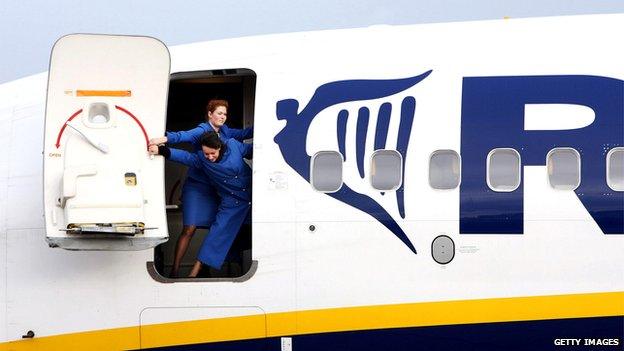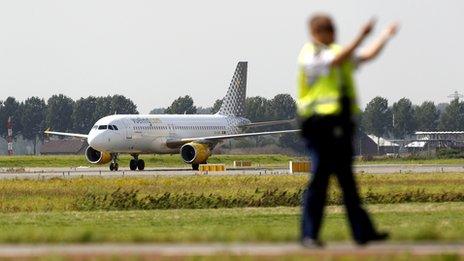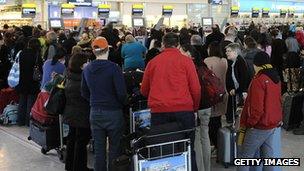Ryanair: Is it really Europe's most punctual airline?
- Published

Ryanair prides itself on turning around flights quickly
Ryanair has announced record profits this week, and the purchase of 175 new Boeing airliners. It's evidently one of Europe's most successful airlines at present - but has it even so been blowing its own trumpet a bit too much?
Ever heard the cheerful jingle on a Ryanair plane as it touches down on the runway?
"Last year over 90% of Ryanair flights landed on time, beating every other European airline."
Quite a boast. According to the statistics that Ryanair puts out itself, they achieved 90% punctuality last year, and have done for the last few years.
But we only have their word for it. There is scant data available to the public on airline punctuality.
The UK's Civil Aviation Authority does collect data on flights arriving and departing from 10 UK airports. It defines "on time" as being within 15 minutes of its stated arrival time.
A website called flightontime.info crunched that data, external and worked out that Ryanair fell short of 90%, achieving only 83% at these 10 airports.
Taking the figures for 2012, bmi regional was the most punctual. Eleven other airlines also beat Ryanair's 83% punctuality record.
Ryanair's overall punctuality score - taking into account its flights landing at or taking off from other airports around Europe - could easily be higher than 83%, says Jim Paton, senior lecturer in the Department of Air Transport at Cranfield University.
"A big proportion of their network in Europe is operations to small airports that don't suffer from air traffic congestion, as would be the case around London and Paris," he says. This makes it easier to avoid delays.
He adds that Ryanair flies to airports where the facilities are relatively close to the runway, so the plane doesn't spend several minutes taxiing, as it would often have to at airports such as Schiphol in Amsterdam.

It takes longer to get to the runway at big airports
The airline says: "Ryanair's published monthly punctuality is calculated as the percentage of all (approx 42,000 on average) Ryanair flights in any month, at all 180 airports, which land ahead of, on, or within 15 minutes of scheduled arrival time."
Punctuality statistics published by third parties are unreliable because their data is based on estimates or incomplete samples, which exclude certain airports, flights or airlines, the company adds.
But the Ryanair jingle also says it is "beating every other European airline" on punctuality. Where does this idea come from?
Ryanair says it is comparing its own punctuality figures with "the most recent Association of European Airlines published statistics".
However, that organisation has not published any new figures since 2009.
In addition, it has only 32 members. Although those members include many big airlines, more than 200 airlines in Europe are not members - including Ryanair.
So there is no public data that proves this claim. And even if there were, it might be hard to take at face value because of a phenomenon known as "schedule padding".
This is when airlines (or other transport companies) stretch their published journey times in order to improve their punctuality record.
"The practice of buffering the airline schedule times is something that is very common, almost universal in Europe and in other parts of the world," says Paton.
He points out that the airlines do after all have to consider the possibility of airport congestion, poor weather conditions, the slot times given to them by the airports, and whether the flight will feed into other flights.
But they also know passengers love to "make up time".
"Some in the industry believe it reduces passenger anxiety. If the aircraft is a little bit late leaving the gate, you might be worried you are going to arrive late," says Paton.

A few words from the pilot can put passengers in a more positive mood
"The pilot comes on the PA system and immediately tells you he is going to make up time.
"That leaves a very positive impact on passengers. They perceive in that situation that airlines are going the extra mile for them."
As Ryanair says it does not engage in schedule padding, we decided to compare its flight times out of Edinburgh airport with those of its competitors.
On the eight routes we were able to identify where Ryanair has rivals, it gave the same or shorter flight times in seven out of eight cases.
Maybe that is because, as Paton says, most airlines pad, or "buffer".
Today British Airways reports a flight time of up to 75 minutes to Amsterdam from London. In 1958 when it was using planes with propellers, it was taking 70 minutes to do the same journey.
What about two other claims Ryanair makes for itself?
The world's favourite airline
Ryanair says it is "the world's favourite airline" because it carries more international passengers than any other airline in the world.

The passenger volume/favourite debate is not new
According to the International Air Transport Association (IATA), Ryanair carried 76 million passengers last year while Lufthansa - in second place - carried 50 million.
But does volume of passengers mean you are the world's favourite?
It is not the first airline to make this claim. British Airways used to call itself the world's favourite airline, a slogan by advertising agency Saatchi and Saatchi in 1989, which it also justified by saying BA carried more international passengers than any other airline.
In the 1990s, Virgin Atlantic lodged complaints about this title to advertising regulators in the US and the UK. But BA persisted with it until 2002, when Lufthansa became the biggest carrier of international passengers.
No 1 for customer service
Ryanair seems to base this claim on a handful of measures. One is punctuality.
Here is another: "Ryanair presently misplaces less than one bag per 3,000 passengers carried. This is the lowest of any European airline."
However, only a fifth of Ryanair passengers put luggage in the hold. In the case of many other airlines, the proportion is much higher.
Also many bags are lost in transit, when a passenger has to change planes, while Ryanair flies point-to-point.
You can follow the Magazine on Twitter, external and on Facebook, external